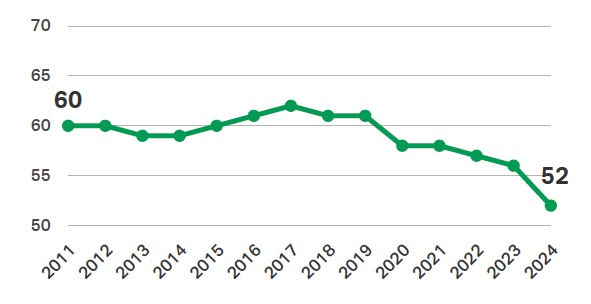We have a management crisis on our hands and it's getting worse.
Gallup’s latest data on employee engagement shows a drop back to COVID-era levels. Gallup writes:
“What caused the decline in engagement? Managers. Manager engagement fell from 30% to 27%. Individual contributor engagement remained flat at 18%.”
This is a flashing red light for CEOs.
Managers are the transmission system of your organization. They convert executive direction into frontline results. When they're disengaged, productivity, innovation, customer service, and ultimately profits all take a hit.
I saw this play out dramatically when I sold a company we had spent many years building to a much larger corporation. We had carefully grown a consistent management system that kept our teams highly engaged and performing. People knew what our goals were, and they had managers who helped them keep aligned with the bigger picture, who coached them regularly, who offered personalized support.
But after the acquisition, that system was replaced with an inconsistent approach. Predictably, engagement — as measured by Gallup’s Q12 survey — plummeted. The team we had so carefully assembled started to look pretty average.
I learned a big lesson when that happened.
It wasn't just about having good people. It was about having good people who were properly managed.
So what can CEOs do about this crisis?
Three things:
Support your managers with real resources. Stop expecting them to figure it out on their own. Give them training in core skills like goal setting, feedback, and development planning. The same Gallup report finds that “less than half of the world’s managers (44%) say they have received management training.” And I would bet that much of that 44% received fairly minimal training that wasn’t integrated into their day-to-day work.

Make management a real profession in your company. Don't just promote your best individual contributors. Look for people who actually want to manage others and show aptitude for it. Research shows that high performance in an individual role does NOT correlate with effectiveness as a manager. That’s because managing people is a whole different job.
Install a consistent management system. Ad hoc approaches don't scale. Your managers need clear processes for things like weekly 1-on-1s, team meetings, and quarterly planning. Each employee deserves an equal opportunity to contribute their best, and if management quality is patchy and inconsistent, they won’t get that. As CEO, you should feel 100% confident that every manager has proper, proven tools for leading — and that they aren’t frustrating and stifling their team. A good management system accomplishes this.
The companies that get this right will have an enormous competitive advantage. But this requires CEOs to step up. To stop treating management as an afterthought. To invest real time and resources in building managerial competence.
Your company's success depends on it.
If you’d like support in giving your managers training and a system that works, shoot me an email: joel@ceosys.co.





